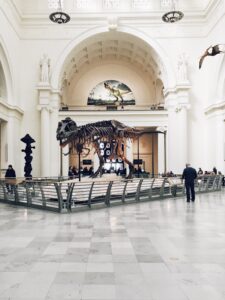By Petra Moelker-Pronk
Like most expats, I came here for new experiences and, most of all, a lot of travelling. Therefore, frustration was high when life was put on hold in recent months. Suddenly, we no longer had the world as our playground. I felt kind of trapped and just wanted one thing: to get back to normal as soon as possible.
But as time passed, something started to slide. For the first time in my life, I didn’t have an overflowing to-do list to finish, and it actually felt very relaxed. That realization opened the door to a different reality. Instead of the planned trip to Bali, I did some interior travelling. Looking for the source of that strange peace.
Viewing your own life with the eyes of a stranger, like an unknown landscape, can yield some surprising insights. Especially if you use a travel guide with some Big Questions, such as, What do I actually want? What is really important? Do I see that reflected in the way I organize my life?
What I saw when I looked back was a boring, straight highway. Most of my life had been about meeting deadlines, which meant constantly juggling time. Social contact, relaxation or my own projects – the interesting, winding side paths – were always incidental. Something I never got around to, because there was always something more urgent. However, urgent is not the same as important.
In that respect, COVID-19 was a wakeup call. For the first time, “work” had a healthy place in my life: amidst other things that are also important and deserve to be taken seriously. Like time for myself, for reflection, my own book… And also, time for family, friends and connection. Because during the long weeks at home I realized to my surprise that that was the only thing
I really missed: social contact. Travelling is a luxury. If you have to, you can perfectly do without. But the ordinary things I had always taken for granted – the joy of dinner with friends, sharing your highs and lows, laughing uncontrollably over crazy stories – proved to be the things that really matter.
Ordinary life is now resuming. Carefully, I start to dream again. Of travelling to Holland, seeing our children and all those beautiful countries that we would still like to visit. But I am kind of reluctant leaving my wonderfully quiet cocoon, entering the outside world. Truth is, I don’t want to go back to normal anymore. What I do want is to create a new normal: life carefully balanced around the things that are dear to me.
I also realize that’s not going to happen all by itself. I will have to actively steer my way towards a new routine, redefining myself in the process. Life is progress, learning, growing and adapting to that growth. As Michelle Obama said in the documentary “Becoming” when someone asked her how she felt about getting back on track after 8 years in the White House, “It’s not getting back on track, but it’s creating my next track.”
 With the ongoing COVID-19 pandemic and the current order for all mosques and places of worship to close in order to reduce the spread of the disease, many are likely wondering how this will affect the celebration of Ramadan. So far, the annual Ramadan bazaar has been cancelled to encourage social distancing. In lieu of a physical bazaar, the government
With the ongoing COVID-19 pandemic and the current order for all mosques and places of worship to close in order to reduce the spread of the disease, many are likely wondering how this will affect the celebration of Ramadan. So far, the annual Ramadan bazaar has been cancelled to encourage social distancing. In lieu of a physical bazaar, the government  If you are not observing Ramadan, you are somewhat able to maintain your normal routine. Purchasing groceries is allowed as is ordering takeaway or delivery from local restaurants. Ordering delivery and pickup from restaurants, who are likely losing revenue due to the ban on in-house dining, is encouraged and a great way to help local businesses in these difficult times.
If you are not observing Ramadan, you are somewhat able to maintain your normal routine. Purchasing groceries is allowed as is ordering takeaway or delivery from local restaurants. Ordering delivery and pickup from restaurants, who are likely losing revenue due to the ban on in-house dining, is encouraged and a great way to help local businesses in these difficult times.  If you are like me, you have varying interests that make sticking to one topic difficult or nearly impossible. There are many colleges that offer classes through online educational platforms like Coursera and edX. Both online learning sites offer
If you are like me, you have varying interests that make sticking to one topic difficult or nearly impossible. There are many colleges that offer classes through online educational platforms like Coursera and edX. Both online learning sites offer  Whether you are an art connoisseur or just enjoy the whimsical experience of walking through a gallery, art is something that anyone can appreciate. No matter your age, educational background or walk of life, there is always something to learn and relish through the experience of a museum. Now, you can visit some of the most famous museums in the world, right from your living room couch. Places like the Louvre, the Guggenheim, the Smithsonian, the British Museum and others offer online tours where you can virtually walk their halls and view all their exhibits for free. Other institutions like the National Gallery of Art and NASA offer virtual tours and online exhibits along with audio lectures about the history of different art pieces and artifacts. You can find the full list of museums offering online tours
Whether you are an art connoisseur or just enjoy the whimsical experience of walking through a gallery, art is something that anyone can appreciate. No matter your age, educational background or walk of life, there is always something to learn and relish through the experience of a museum. Now, you can visit some of the most famous museums in the world, right from your living room couch. Places like the Louvre, the Guggenheim, the Smithsonian, the British Museum and others offer online tours where you can virtually walk their halls and view all their exhibits for free. Other institutions like the National Gallery of Art and NASA offer virtual tours and online exhibits along with audio lectures about the history of different art pieces and artifacts. You can find the full list of museums offering online tours